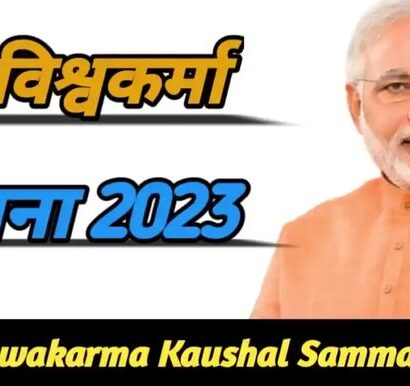
The PM Vishwakarma Scheme, christened after Lord Vishwakarma, the celestial architect and craftsman of Hindu mythology, is an ambitious government endeavor aimed at elevating the status of artisans, craftsmen, and traditional workers spanning various industries in India. This scheme not only recognizes the immense contributions of these skilled individuals to India’s rich cultural heritage but also strives to empower them through initiatives focused on skill development, technology upgradation, financial support, and entrepreneurship development.
Table of Contents
Essential Elements of the PM Vishwakarma Scheme:
Skill Development Training:
- The core of this scheme lies in imparting comprehensive skill development training to artisans and craftsmen, honing their traditional skills and knowledge. The training programs encompass a broad spectrum of traditional crafts, arts, and trades, ensuring that artisans possess the necessary expertise to excel in their respective fields.
- The training sessions may comprise practical workshops, demonstrations, and theoretical classes conducted by seasoned artisans, experts, and trainers. Specialized training modules may also be formulated to cater to the unique requirements of different crafts and trades.
Technology Upgradation
- To enhance the efficiency, quality, and productivity of traditional industries, the scheme facilitates the adoption of contemporary tools, machinery, and equipment. Artisans are granted access to cutting-edge technologies that can streamline production processes, reduce labor, and boost overall output.
- Technology upgradation initiatives may involve establishing common facility centers equipped with state-of-the-art machinery, conducting technology awareness camps, and offering subsidies or incentives for the acquisition of modern equipment.
Economic Assistance
- The initiative offers economic support, subsidies, grants, or loans to craftsmen and artisans in order to assist their entrepreneurial endeavors, establish workshops, acquire necessary equipment, or procure raw materials. The main objective of this support is to reduce financial barriers and empower artisans to invest in their businesses and infrastructure.
- Collaborations between various government schemes and financial institutions ensure that artisans have access to crucial funding under the PM Vishwakarma Scheme, enabling them to sustain and expand their operations.
Market Connections
- Access to markets is essential for artisans to sell their products and generate sustainable income. As part of the scheme, efforts are made to establish market connections for artisans both domestically and internationally through the organization of exhibitions, trade fairs, craft melas, and promotional events.
- Additionally, digital platforms and e-commerce channels are utilized to showcase traditional crafts and products to a wider audience and facilitate direct sales.
Entrepreneurial Training
- The scheme recognizes the potential of artisans to become successful entrepreneurs and provides support and guidance in entrepreneurial development. This includes assistance in creating a business plan, devising effective marketing strategies, managing finances, and accessing credit facilities.
- Through these entrepreneurial training programs, artisans are empowered to start their own businesses, effectively manage their operations, and create employment opportunities for themselves and others in their communities.
Appreciation and Advancement
- The PM Vishwakarma Scheme aspires to appreciate and advance the abundant cultural legacy of India’s traditional arts and crafts. Artisans and craftsmen are encouraged to safeguard and promote the traditional techniques, designs, and craftsmanship.
- In order to raise awareness about traditional crafts, showcase the expertise of artisans, and stimulate market demand for their products, various initiatives such as branding, certification, and promotional campaigns are undertaken.
Overall, the PM Vishwakarma Scheme strives to rejuvenate traditional industries, conserve cultural heritage, and empower artisans to thrive in a modern economy. Through provision of skill development, technology upgradation, financial aid, and entrepreneurship opportunities, the scheme aims to create sustainable livelihoods, foster economic growth, and preserve India’s diverse cultural inheritance for future generations.
Who can apply for PM Vishwakarma Scheme?
The scheme established by PM Vishwakarma primarily targets traditional workers, artisans, and craftsmen from a variety of sectors in India. These individuals may include:
- Artisans: Highly skilled craftsmen specializing in traditional arts and crafts such as pottery, weaving, wood carving, metalwork, embroidery, and jewelry making.
- Craftsmen: Experts in specific crafts or trades, such as carpentry, blacksmithing, stone carving, glassblowing, and leatherworking.
- Traditional Workers: Occupations and trades passed down through generations, including boatmaking, basket weaving, handloom weaving, and pottery.
- Micro and Small Enterprises (MSEs): Small-scale enterprises involved in traditional manufacturing, processing, and production, often run by skilled artisans or craftsmen.
- Self-Employed Individuals: Independent workers or those involved in a family business, utilizing traditional skills and trades to earn a living.
- Entrepreneurs: Ambitious individuals seeking to establish or expand businesses related to traditional crafts, arts, or trades, utilizing the support and resources provided by the scheme.
The prime objective of the PM Vishwakarma Scheme is to empower these individuals by offering skill development training, technology upgradation, financial assistance, market linkages, and entrepreneurial opportunities, enabling them to improve their livelihoods, preserve cultural heritage, and contribute to economic growth. Eligibility requirements and application procedures may vary depending on the specific components and guidelines of the scheme implemented at the state and national levels by respective government departments or agencies.
What is the PM Vishwakarma Scheme?
The PM Vishwakarma Scheme is a government initiative aimed at empowering artisans, craftsmen, and traditional workers by providing skill development training, technology upgradation, financial support, market linkages, and entrepreneurship opportunities.
Who is eligible to apply for the PM Vishwakarma Scheme?
Eligibility criteria may vary depending on the specific components of the scheme and the implementing agencies. Typically, artisans, craftsmen, traditional workers, micro and small enterprises (MSEs), and self-employed individuals engaged in traditional occupations are eligible to apply.
What types of support are available under the PM Vishwakarma Scheme?
The scheme offers various forms of support, including skill development training, technology upgradation, financial assistance, market linkages, and entrepreneurship development programs tailored to the needs of artisans and craftsmen.
How can I apply for the PM Vishwakarma Scheme?
Application procedures may vary depending on the implementing agencies and the specific components of the scheme. Interested individuals can contact designated government departments, agencies, or financial institutions for information on eligibility criteria and application processes. here we are providing link for applying PM Vishwakarma Scheme.
What documents are required for applying to the PM Vishwakarma Scheme?
Required documents may include proof of identity, proof of residence, proof of occupation or employment in a traditional craft or trade, bank account details, and any other documents specified by the implementing agencies for verification and eligibility assessment.
- Official Link: https://pmvishwakarma.gov.in
- Visit us: http://recipestrend.com





Ed